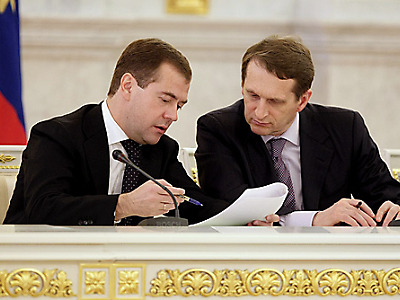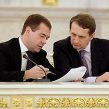
Moscow Relaxes NGO Legislation in the North Caucasus
Publication: Eurasia Daily Monitor Volume: 6 Issue: 145
By:

On July 20 President Dmitry Medvedev signed into law amendments to Russian NGO legislation. The changes make it easier for the NGO’s to register with the government, to report on their activities and limit government agencies’ ability to perform regular checks on NGO’s (www.kremlin.ru, July 20).
The NGO law that was introduced in Russia in 2006 was sharply criticized by many experts as well as the NGO’s. Human Rights Watch released a report on June 17 on the condition of civil society in Russia ("Uncivil Approach to Civil Society") that was highly critical of the Russian government’s methods in dealing with NGO’s. According to the head of the Helsinki Rights Group in Moscow Lyudmila Alekseeva, the number of NGO’s in Russia diminished from 600,000 in 2002 to 200,000 in 2008 (www.newsru.com, April 8, 2008).
The latest amendments do not appear to have altered the restrictive nature of the existing NGO legislation that evolved over the past few years. For instance, last year the Russian government limited the number of foreign donor organizations whose grants are not subject to taxation in Russia from 101 to 12.
The response to the modest attempt to liberalize the existing NGO laws from some of the authorities in the North Caucasus was astonishing. The President of Karachai-Cherkessia Boris Ebzeev, emphasized the need for control over NGO’s, saying that it was a security problem for Russia and that the statehood principle should prevail above all else (Caucasian Knot, July 7). Ebzeev, formerly a member of the Russian constitutional court did not even acknowledge that the good of the people should come before the interests of the state.
Regarding the NGO’s as a security threat to Russia has become almost a tradition among members of the government. In April 2008 the then head of the Federal Security Service (FSB) Nikolai Patrushev accused unspecified foreign NGO’s of not simply supporting Islamic militants in the North Caucasus, but of recruiting young people for them. Alexander Torshin, the Vice-Speaker of the Russian Federation Council counted 59 NGO’s that supported "Chechen terrorists" (www.gazeta.ru, April 8, 2008). Judging by this, and given the fact that both men still occupy key positions within the Russian government, the liberalization attempts of NGO legislation are likely to face an uphill battle.
The explanation for the government’s crackdown on NGO’s most likely stems from Russia’s totalitarian past. According to the Deputy-Director of the Moscow-based Center for Political Technology Alexei Makarkin, "the Russian authorities and western organizations that support democratic development, have a different understanding of what political life might represent. From the westerners’ point of view, politics is all about political parties. From the Russian authorities’ point of view everything even obliquely related to the political process is politics" (www.polit.ru, July 20, 2005).
More fundamentally, independent NGO’s are almost bound to be regarded in Russia as somewhat inimical entities, as historically the Russian state has tended to control all associations of individuals, including the Russian Orthodox Church. Therefore, the idea that some NGO’s, such as those advocating human rights, need to be not only independent from the state but often opposed to it, is revolutionary in Russia, especially to Russian officials with a KGB background, accustomed to exercising total control over society.
Civil society in the North Caucasus is in an even more precarious condition, since much of Moscow’s criticism of the NGO’s is linked to their work in this region. As Moscow is worried about its control over public life in the North Caucasus, more than perhaps anywhere else in the country, it is especially wary of independent civil organizations. Therefore, unless an NGO is under direct state control, it has little chance to survive in the North Caucasus. Even an utterly depoliticized enterprise like the charitable hospital for women in Makhachkala has practically been ruined, following repeated attacks by the government (www.sovetpamfilova.ru, March 3).
The Russian authorities were especially harsh in their treatment of foreign NGO’s that worked with Chechen refugees. Many of them were barred from Russia, like the Czech NGO People in Need, essentially for their humanitarian activities in the region. Another way of countering what was described by the authorities as the hostile involvement of foreign powers in Russian civil society was the introduction in 2006 of a government grants system. These government grants, however, went predominantly to the pro-Kremlin NGO’s, while the NGO’s opposing the regime in one way or another received nothing.
Thus, the conditions for the development of civil society in the North Caucasus are gloomy. Foreign funding is virtually inaccessible for NGO’s in the North Caucasus. Kremlin sponsored grants do not reach any activists that oppose the current political regime either in Moscow or in their respective republics. This coupled with businesses’ understandable timidity to support any kind of opposition provides zero growth rates for civil society in the North Caucasus.
Moscow might believe that putting pressure on civil society in the North Caucasus is a good idea, since very few independent people are left who can articulate the public’s concerns, and even those that can are excluded from the official discourse and deprived of publicity. However, the reverse side of this is that more people turn to violence, as there is no peaceful route for them to express their political opinions or to settle the disputes that they have with the authorities.




